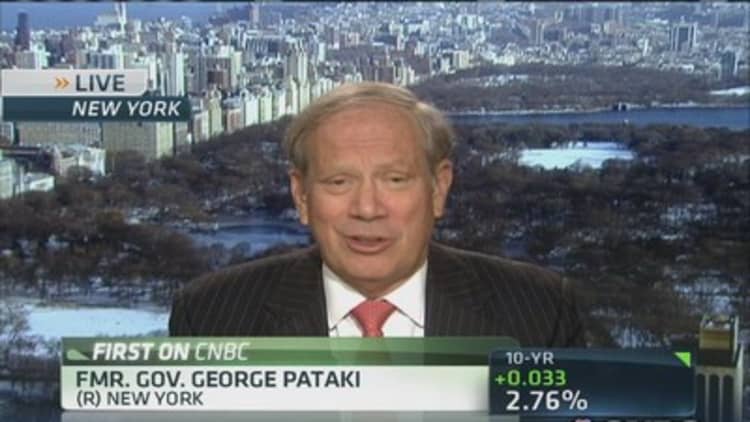
The state-to-state spread of online gambling will fuel terrorism networks and transnational organized crime as it makes money laundering easier for those groups, former New York Gov. George Pataki told CNBC on Wednesday, citing the FBI.
"They have said it's going to be very difficult if not impossible to monitor this," said Pataki, the co-chair of the Coalition to Stop Internet Gambling, a public campaign backed by Las Vegas casino magnate Sheldon Adelson. "Changing the law that was in effect for 20 years simply by [a] ruling of the Department of Justice, this is not in the American people's interest."
(Read more: Hackers target casino websites linked to Sheldon Adelson)
Pataki made the claim about money laundering several times during an interview on "Squawk on the Street." His comments come amid an interindustry fight between brick-and-mortar casino interests, led by Adelson, and gambling entrepreneurs who want to expand digital gaming. Last year, New Jersey became the third state to allow online gambling
Online gambling advocates formed the Coalition for Consumer & Online Protection to fight Adelson's public campaign, which released its first video commercial on Monday, styled in the same fashion as political attack ads. Mike Oxley, a former Ohio congressman and former FBI agent, serves as the group's chairman. He told CNBC that banning online gambling on a national level would not protect people.
(Read more: )
Millions of U.S. residents already gamble online in states that prohibit the practice, logging on to services based overseas and tied to black markets, he said. Banning the practice would only drive more of those users to less secure platforms, Oxley said.
"The risk of exposure to identity theft, fraud, even money laundering on an unsafe, unregulated, overseas black-market website is serious," Oxley said in a statement to CNBC. "And ignoring that black market, rather than addressing it will only allow those markets to continue thriving and make us all less safe online."
Pataki said the proliferation of online gambling shouldn't happen on a state-by-state level, and that the entire U.S. electorate should decide the issue. The gambling industry, once limited to Las Vegas, has always been tightly regulated and monitored, he added, and it should remain in physical casinos rather than always-connected online services.
(Read more: The 15 most bizarre Super Bowl bets)
"You have to make a conscious decision to travel to a casino," Pataki said. "Those casinos are well-regulated, and subject to tremendous law enforcement and other regulatory authorities. It's completely different from just sitting around a college dorm at 1 in the morning and deciding to play online poker or gamble."
—By CNBC's Jeff Morganteen. Follow him on Twitter at @jmorganteen and get the latest stories from "Squawk on the Street." Reuters and the Associated Press contributed to this report.


